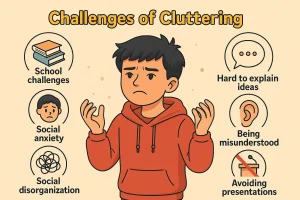Stutter Breath: Causes, Symptoms, and How to Breathe Smoothly
Last Updated: February 11, 2025
Have you ever found yourself struggling to catch a smooth breath, feeling like your breathing is interrupted or stuttering? This phenomenon, known as stutter breath, can be quite distressing. Stutter breath refers to irregular or interrupted breathing patterns, often causing discomfort and anxiety. It can happen to anyone and is influenced by various factors such as stress, medical conditions, or even simple coordination issues between breathing and speech.
Understanding the causes of stutter breath is crucial. When you know what’s behind your irregular breathing, you can take steps to address it effectively. By identifying the root causes, whether they are related to stress, medical issues, or other factors, you can seek appropriate treatments and interventions. This knowledge empowers you to manage your symptoms better and improve your overall quality of life.
Book Your Online Speech Counselling Now
What is Stutter Breath?
Definition of Stutter Breath
Stutter breath, also known as stammering breath or irregular breathing, is a condition where a person’s breathing pattern becomes disrupted, leading to pauses, repetitions, or prolonged sounds during exhalation. This can occur sporadically or persistently, depending on the underlying cause.
Common Symptoms Associated with Stutter Breath
Recognizing the symptoms of stutter breath is the first step in addressing the issue. Common symptoms include:
- Pauses in breathing while speaking
- Repetition of breaths or sounds
- Difficulty in completing a sentence without interruption
- Feeling short of breath or struggling to catch a full breath
- Increased effort to breathe smoothly
These symptoms can vary in intensity and frequency, often becoming more pronounced during stressful situations or when trying to speak quickly.
How Stutter Breath Differs from Normal Breathing Difficulties
While normal breathing difficulties, such as those experienced during physical exertion or respiratory illnesses, typically involve consistent patterns of breathlessness or wheezing, stutter breath is characterized by its irregular and unpredictable nature. Unlike conditions like asthma or chronic obstructive pulmonary disease (COPD), which have more uniform symptoms, stutter breath involves intermittent disruptions that specifically affect the coordination of speech and breathing.
Common Causes of Stutter Breath
Understanding the common causes of stutter breath is crucial for effectively managing and addressing this condition. Let’s explore the primary and secondary causes in detail.
Primary Cause: Speech and Breathing Coordination Issues
One of the main causes of stutter breath is the difficulty in coordinating speech and breathing. When we speak, our breath control plays a vital role in producing smooth and uninterrupted speech. Here’s how it works:
- Speech Production and Breath Control: During speech, the diaphragm and other muscles work together to regulate airflow, allowing for the controlled release of breath. This coordination ensures that each word and sentence flows seamlessly.
However, this coordination can sometimes fail, leading to stutter breath. Here are some situations where this might happen:
- Examples of Coordination Failures:
- Speaking Quickly: Rushing through sentences without proper breath control can cause interruptions.
- Public Speaking: Nervousness and anxiety during public speaking can disrupt the natural flow of breathing and speech.
- Complex Sentences: Trying to articulate long or complex sentences without taking adequate breaths can lead to stutter breath.
Secondary Causes
While speech and breathing coordination issues are primary contributors, several secondary causes can also lead to stutter breath. These include anxiety and stress, medical conditions, and physical obstructions.
Anxiety and Stress
Stress and anxiety are significant factors that can affect breathing patterns. When we’re stressed or anxious, our body’s natural response is to enter a “fight or flight” mode, which can lead to shallow or irregular breathing.
- How Stress Affects Breathing Patterns:
- Increased Heart Rate: Anxiety can cause the heart rate to increase, leading to rapid, shallow breaths.
- Muscle Tension: Stress often causes muscle tension, including in the chest and diaphragm, making it harder to breathe smoothly.
- Examples of Stress-Inducing Situations:
- Public Speaking: As mentioned earlier, anxiety about speaking in front of others can cause breath disruptions.
- High-Pressure Environments: Work stress or personal conflicts can also trigger stutter breath.
Medical Conditions
Various medical conditions can contribute to stutter breath by affecting the respiratory system or the neurological pathways involved in speech.
- Asthma and COPD: Conditions like asthma and Chronic Obstructive Pulmonary Disease (COPD) can cause consistent breathing difficulties, which may lead to stutter breath.
- Neurological Conditions: Disorders affecting the brain and nervous system, such as Parkinson’s disease or stroke, can impair speech and breathing coordination.
Physical Obstructions
Physical obstructions in the nasal passages or airways can also cause stutter breath by restricting airflow.
- Nasal Polyps and Deviated Septum: Conditions like nasal polyps or a deviated septum can block the nasal passages, making it difficult to breathe smoothly and consistently.
How to Identify Stutter Breath
Identifying stutter breath early is crucial for managing and treating this condition effectively. Let’s look at the signs and symptoms to watch for, when to seek professional help, and why early detection and intervention are important.
Signs and Symptoms to Watch For
Stutter breath can manifest in various ways. Here are some key signs and symptoms to be aware of:
- Pauses in Breathing While Speaking: Noticeable interruptions in the flow of breath while trying to speak.
- Repetitions or Prolonged Sounds: Frequent repetition of breaths or sounds, causing speech to stutter.
- Difficulty Completing Sentences: Struggling to finish sentences without taking multiple breaths.
- Shortness of Breath: Feeling out of breath or needing to take deep breaths frequently.
- Increased Effort in Breathing: Putting in extra effort to breathe smoothly, especially while talking.
These symptoms can vary in intensity and may become more noticeable in stressful situations or when trying to speak quickly.
Also Read: 10 Quick Tips for Clear and Stammer-Free Speech!
When to Seek Professional Help
While occasional stutter breath may not be a cause for concern, persistent or severe symptoms should prompt a visit to a healthcare professional. Here are some indicators that it’s time to seek help:
- Persistent Symptoms: If stutter breath occurs frequently and affects daily activities.
- Impact on Communication: When stutter breath hinders effective communication at work, school, or social settings.
- Associated Health Issues: If stutter breath is accompanied by other symptoms such as chest pain, dizziness, or severe anxiety.
- Lack of Improvement: When self-help techniques and exercises do not alleviate the symptoms.
Importance of Early Detection and Intervention
Early detection and intervention are key to managing stutter breath effectively. Here’s why:
- Preventing Complications: Addressing stutter breath early can prevent it from worsening or leading to other respiratory issues.
- Improving Quality of Life: Timely intervention can significantly enhance communication skills, boost confidence, and reduce anxiety.
- Tailored Treatment Plans: Early diagnosis allows for personalized treatment strategies, which may include breathing exercises, speech therapy, or medical interventions
Managing and Treating Stutter Breath
Managing and treating stutter breath involves a combination of techniques and interventions that can significantly improve breath control and overall well-being. Here’s a look at some effective methods.
Breathing Exercises
Improving breath control through specific exercises can be highly beneficial for managing stutter breath. Here are some simple exercises to try:
- Diaphragmatic Breathing:
- Step-by-Step Guide:
- Sit or lie down in a comfortable position.
- Place one hand on your chest and the other on your abdomen.
- Inhale deeply through your nose, ensuring your abdomen rises more than your chest.
- Exhale slowly through your mouth, feeling your abdomen fall.
- Repeat for 5-10 minutes daily.
- Step-by-Step Guide:
- Pursed-Lip Breathing:
- Step-by-Step Guide:
- Inhale slowly through your nose for a count of two.
- Pucker your lips as if you’re about to blow out a candle.
- Exhale gently through your pursed lips for a count of four.
- Practice this exercise several times a day, especially during stressful moments.
- Step-by-Step Guide:
These exercises can help improve lung capacity and make breathing more controlled and efficient.
Stress Management Techniques
Since anxiety and stress can exacerbate stutter breath, managing these factors is crucial. Here are some effective methods:
- Mindfulness Meditation: Practicing mindfulness helps focus on the present moment, reducing anxiety and promoting calmness.
- How to Practice:
- Find a quiet space and sit comfortably.
- Close your eyes and take deep breaths.
- Focus on your breath, feeling each inhale and exhale.
- If your mind wanders, gently bring it back to your breath.
- How to Practice:
- Progressive Muscle Relaxation: This technique involves tensing and then relaxing different muscle groups to reduce physical tension and stress.
- How to Practice:
- Start with your toes and work your way up to your head.
- Tense each muscle group for 5 seconds, then release.
- Notice the difference between tension and relaxation.
- How to Practice:
- Creating a Calm Environment: A peaceful environment can significantly impact your breathing. Reduce noise, clutter, and create a space where you can relax and focus on your breath.
Medical Interventions
For those with persistent or severe stutter breath, medical intervention might be necessary. Here’s when and how to seek help:
- When to Consult a Doctor: If you experience ongoing stutter breath that affects daily life or is accompanied by other symptoms like chest pain or dizziness, it’s essential to see a healthcare provider.
- Possible Treatments and Therapies:
- Medications: Doctors may prescribe medications for underlying conditions such as asthma or anxiety.
- Respiratory Therapy: For conditions like COPD, respiratory therapy can help improve breathing techniques and lung function.
- Surgical Options: In cases of physical obstructions like nasal polyps, surgery might be required to clear the airways.
Speech Therapy
Speech therapy plays a vital role in managing stutter breath, particularly when it impacts communication. Here’s how speech therapists can help:
- Role of Speech Therapists: These professionals work to improve the coordination between speech and breathing, helping individuals develop smoother and more controlled speech patterns.
- Common Speech Therapy Techniques:
- Breathing Exercises: Similar to the ones mentioned earlier, but tailored to individual needs.
- Fluency Shaping: Techniques aimed at modifying speech patterns to improve fluency and reduce stuttering.
- Cognitive-Behavioral Therapy (CBT): Helps address the anxiety and stress associated with stutter breath, focusing on changing negative thought patterns.
Conclusion
Stutter breath can affect your daily life, but understanding it can make a big difference. It causes irregular breathing that disrupts speech, with symptoms like pauses, breath repetitions, and trouble finishing sentences. Common causes include stress, anxiety, medical conditions, and speech-breathing coordination issues. Early detection and professional help are key to managing it effectively. Simple breathing exercises, stress management, medical support, and speech therapy can help. Don’t wait—seek help if needed. Visit Wellness Hub for expert guidance, resources, and support. Taking the first step can lead to smoother breathing and a healthier, happier life.
Frequently Asked Questions:
1. What causes stutter breath?
Stutter breath can be caused by various factors, including speech and breathing coordination issues, anxiety and stress, medical conditions such as asthma or COPD, and physical obstructions like nasal polyps or a deviated septum.
2. How can I stop stutter breathing?
You can manage stutter breath by practicing breathing exercises like diaphragmatic and pursed-lip breathing, reducing stress through mindfulness and relaxation techniques, and seeking medical or speech therapy if needed.
3. Why do I experience stutter breath?
Stutter breath often occurs due to disruptions in the coordination between speech and breathing. Stress, anxiety, and certain medical conditions can also contribute to this issue.
4. Can stutter breath be treated?
Yes, stutter breath can be treated through a combination of breathing exercises, stress management techniques, medical interventions for underlying conditions, and speech therapy to improve breath control during speech.
5. What are the symptoms of stutter breath?
Symptoms of stutter breath include pauses in breathing while speaking, repetitions or prolonged sounds, difficulty completing sentences, shortness of breath, and increased effort in breathing.
6. When should I seek professional help for stutter breath?
You should seek professional help if you experience persistent or severe symptoms of stutter breath that affect your daily activities, communication, or are accompanied by other concerning symptoms like chest pain or dizziness.
7. How does stress affect breathing patterns?
Stress can lead to shallow and rapid breathing, increased heart rate, and muscle tension, all of which can disrupt normal breathing patterns and contribute to stutter breath.
8. What breathing exercises can help with stutter breath?
Breathing exercises such as diaphragmatic breathing and pursed-lip breathing can help improve breath control and reduce the symptoms of stutter breath.
9. What role does speech therapy play in managing stutter breath?
Speech therapists help individuals improve the coordination between speech and breathing, teach breathing exercises, and use techniques like fluency shaping and cognitive-behavioral therapy to manage stutter breath effectively.
10. Are there medical treatments for stutter breath?
Yes, depending on the underlying cause, medical treatments may include medications for respiratory conditions, respiratory therapy, or surgical interventions to remove physical obstructions in the airways.
About the Author:
Anuradha Karanam
Speech-language pathologist (7+ years of experience)
Anuradha Karanam is a skilled speech-language pathologist with over 6 years of experience. Fluent in Tamil, Telugu, Hindi, and English, she specializes in parent counseling, speech sound disorders, fluency assessment, and speech-language evaluations. Anuradha excels at working with children with developmental disorders, offering creative and effective therapy programs. Currently, at Wellness Hub, she holds a BASLP degree and is registered with the RCI (CRR No A85500). Her patience, ambition, and dedication make her a trusted expert.
Book your Free Consultation Today
Parent/Caregiver Info:
Client’s Details:
* Error Message









